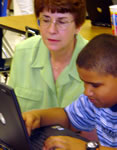The teacher librarian must be prepared for a wide variety of leadership roles in the learning community. These multifaceted roles require a thirst for knowledge and a commitment to on-going professional development.
 The library media specialist has many roles and responsibilities including teacher, instructional partner, information specialist, and program administrator (Information Power, p. 4-5).
The library media specialist has many roles and responsibilities including teacher, instructional partner, information specialist, and program administrator (Information Power, p. 4-5).
Teacher. The teacher librarian must be an effective educator and curricular leader. The media specialist must possess up-to-date knowledge and skills on a wide range of educational topics including teaching, learning, and information literacy.
Example - the teacher librarian must be prepared to teach and collaborate on all aspects of information inquiry across disciplines and grade levels. In the morning the teacher librarian may be guiding a class through the evaluation of websites for a science project, while the afternoon may be spent teaching a small group to use the video camera for recording oral histories.
Instructional Partner. The teacher librarian must build collaborative partnerships throughout the learning community. The media specialists must be a leader in the development of policies and practices that support information literacy as well as learning across the curriculum. This involves working closely with committees and individual teachers to develop effective learning environments of students.
Example - the teacher librarian might bring together teachers from various disciplines to plan strategies that reduce plagiarism in the school.
Information Specialist. The teacher librarian must be an expert in locating, evaluating, and synthesizing information. Whether collaborating with the principal on a budget issue or teaching fifth graders to use electronic databases, the media specialist must model strategies for using a spectrum of traditional and new information tools and resources.
Example - the teacher librarian might work with a group of teachers on writing a grant proposal for funding an environmental education program. Assistance in locating background information, research for the literature review, and budget information would be a valuable contribution to this partnership.
Program Administrator. The teacher librarian must manage all activities associated with the library media program including budgeting, staffing, collection development, promotion, instructional, and facilities.
Example - the teacher librarian may initiate a cadet librarian program to help youth learn about the professional, but also assist in basic tasks such as collection circulation, shelving, and technical support.
![]() Read Roles and Responsibilities of the School Library Media Specialist from
Information Power
Read Roles and Responsibilities of the School Library Media Specialist from
Information Power
Read The
Metaphor Is the Message by G. Hartzell in School
Library Journal, June 2002; 48(6), 33. (Access requires
login). Librarians
are much more than merely 'information managers’; multiple
metaphors are needed.
Read The
Teaching Role: Are Librarians Teachers? by R.V. Small.
School Library Media Research. Editors Choice Resources: The Best of
ERIC.
Read Why Do We Need School Libraries? Librarian's Boost Learning! , Dec. 2005 (pdf document) by M. Graham, an IUPUI student paper.
Also read Birds
of a Feather by
S. Joiner. School Library Journal, May 2005; (51)5, 42-5. (Access
requires login)
![]() Read
the following chapters by C.A. Doll in Collaboration
and the School Library Specialist:
Read
the following chapters by C.A. Doll in Collaboration
and the School Library Specialist:
Chapters 4, 5, 6 and Appendix by
J. Watt
Read the following chapters by B.J. Morris in Administering the
School Library Media Center: Chapters 3 and 4.
![]() This section of the course contains the following related topics you'll want to investigate:
This section of the course contains the following related topics you'll want to investigate:
Your Role as a Professional
Organizations
E-Communication
Journals
Books
Websites
Notable Library Media Professionals
Government Resources
Collection Development Resources
Can a library media specialist really do all these things?
As you look at the expectations, the responsibilities may seem overwhelming. However all of the roles are important and demanded by today's library media program. Of course a teacher librarian can't do all of these things alone. That's the reason that collaboration, leadership, and technology are three key themes in a library media program.
Through collaboration, the media specialist is able to accomplish more than he or she could alone.
Through leadership, the teacher librarian can recruit others to participate in activities.
Through technology, the library media specialist can make center operations run smoothly, creating more time to focus on the most important program goals.
![]() Read School
Library Media Specialists' Perceptions of Practice and Importance
of Roles Described in Information Power by A. McCracken
in School Library Media Research, 4, 2001.
Read School
Library Media Specialists' Perceptions of Practice and Importance
of Roles Described in Information Power by A. McCracken
in School Library Media Research, 4, 2001.
Also read Teachers
of Library and Media from the Division of
Professional Standards, Indiana Department of Education. (Readers
from outside the state may substitute the standards requirements
of their own states)
Words of Wisdom
As you think about the roles and responsibilities of today's library media specialist, it's important to keep it all in perspective. What drew you to this profession? How will your choices and actions impact the lives of teachers and students?
 Read the perspective of one library media specialist:
Read the perspective of one library media specialist:
I read in LM_Net one time a posting from a new library media specialist who was preparing for her first meeting with her staff. She wanted to go over her library policies and copyright issues at that first meeting and wanted to know if there was anything else she should cover. I wrote back advising her that if she wants to make a good start with her new staff, she should not talk about library policies and copyright issues at that meeting. Maybe not ever talk about them. I’m not the copyright policewoman. I have my policies and copyright guidance posted for teachers and let them do their own thing. Instead, I talk to my staff about library programming, what I can do for and with them, books, and kids. You see, I am a teacher, too. I eat lunch with my buddies in the lounge and BS with teachers in the hallway between classes. I am here because I am a teacher. I tried to get a job teaching secondary social studies but constantly heard that “you’re a great candidate, but we need a coach first.” So I asked Dave Kinman, Director of the School of Education at Indiana University to give me guidance. He suggested I call Danny Callison to talk over the school library media program. Dr. Kinman explained that the school library is a different place these days. A perfect place for a teacher.
Every Thursday last year at 11:00 I had a student named Julie sitting at my feet. Sometimes on them. As she got more comfortable over the year, she would sometimes touch my skirt or rub my leg. She asked me every Thursday about my two little girls, and I gladly shared stories with her class. The whole school now knows all the funny stories of my girls and will yell out a hello to them when they see them at the grocery store or park. One Thursday Julie was absent, and I became concerned when she missed the next week. Turns out she had had a bad accident and was in the hospital. I called and sent a book and when she returned, I cut my lunch short so I could help her catch up with her school work. Her family doesn’t speak much English so I knew she needed some help. The hugs I get from her in the hallway are my payment. I’m paid well indeed.
Catherine Trinkle
Media Specialist
Hickory Elementary
ctrinkle@avon.k12.in.us
Check Your Understandings
![]() Information Power - Collaboration, leadership, and technology ... are woven throughout the descriptions of library media specialist's specific responsibilities: as teacher, as instructional partner, as information specialist, as program administrator. (p. 4)
Information Power - Collaboration, leadership, and technology ... are woven throughout the descriptions of library media specialist's specific responsibilities: as teacher, as instructional partner, as information specialist, as program administrator. (p. 4)
Information Power - Program Administration: Principle 2. In every school, a minimum of one full-time, certified/licensed library media specialist supported by qualified staff is fundamental to the implementation of an effective library media program at the building level. (p. 100, 103)
According to G. Hartzell in The Metaphor Is the Message, we may be limiting ourselves by using traditional metaphors to describe ourselves and our work. Do you agree or disagree with his perspective? Why?
Come up with a unique metaphor to describe a library media program and the various roles of the library media specialist. Are you like a grove of Aspen trees or maybe a hive of bees?
Make It Real
 Read School
Library Media Specialists' Perceptions of Practice and Importance
of Roles Described in Information Power by A. McCracken
in School Library Media Research, 4, 2001.
Read School
Library Media Specialists' Perceptions of Practice and Importance
of Roles Described in Information Power by A. McCracken
in School Library Media Research, 4, 2001.
A library media specialist has many roles and responsibilities. Interview to a media specialist about their various roles including teacher, instructional partner, information specialist, and program administrator. Ask them to share an anecdote related to each of these four roles. Then analyze their stories. Did their anecdotes contain elements of collaboration, leadership, and technology? Is this important? Why or why not?
Compare the perceptions of the media specialist you interviewed with the results of McCracken's study.
Read More About It
Alewine, M. School Library Media Specialists: Essentially Administrators. Knowledge Quest, 32(2), Nov/Dec 2003.
http://www.ala.org/ala/aasl/...
How we manage, or administer, our program determines how well we can meet our clients’ information needs.
America's Public School Libraries: 1953–2000.
National Center for Education Statistics.
http://nces.ed.gov/pubsearch/pubsinfo.asp?pubid=2005324
Drawn from federal reports and surveys, this
booklet presents a history of federal legislation and national standards affecting
school library media centers and key characteristics of school libraries at the
national level.
Bromann, J. Trading Places. School
Library Journal, April 2004; (50)4, 48-52. (Access
requires login).
http://www.schoollibraryjournal.com/...
In pursuit of higher pay and better hours, a hardworking public librarian turns to schools.
DeCandido, G. Ten Graces for New Librarians, 1996.
http://www.well.com/user/ladyhawk/albany.html
Commencement address, School of Information Science and Policy, SUNY/Albany.
Holton, Barbara, Bae, Yupin, Baldridge, Susan, Brown, Michelle & Heffron, Heffron, Mar. 2004. The Status of Public and Private School Library Media Centers in the United States: 1999–2000. National Center for Education Statistics.
http://www.nces.ed.gov/pubs2004/2004313.pdf
This report summarizes findings from the public and private School Library Media Center Questionnaires, a component of the 1999–2000 Schools and Staffing Survey (SASS). Topics addressed in this report are: characteristics of the library media center, staff characteristics, library expenditures, collection holdings, and library policies.
Information Power from American Association of School Librarians
http://www.ala.org/ala/aasl/aaslproftools/informationpower/informationpower.htm
Johnson, D. Why Do We Need Libraries
When We Have the Internet? Knowledge
Quest, AASL;
27(1), Mar. 1999.
http://www.doug-johnson.com/dougwri/internet.html
Learning About the Job from American Association of School Librarians
http://www.ala.org/ala/...
Loertsher, D.& Woolls, B. You Need
the Library to Meet Standards. Learning Quarterly, School Library
Journal, June 2003.
http://www.schoollibraryjournal.com/article/CA300728
Librarians recently reported a baffling paradox: Some teachers are avoiding their school library to focus on state standards solely in the classroom.
McCracken, A. School Library Media Specialists'
Perceptions of Practice and Importance of Roles Described in Information
Power. School Library Media Research, 4, 2001.
http://www.ala.org/...
Miller, K. Novice Teachers Perceptions of
the Role of the Teacher-librarian in Information Literacy.
School Libraries in Canada. Candian Association for School Libraries.
http://www.schoollibraries.ca/articles/141.aspx
Simpson, C. The School Librarian’s Role in the Electronic Age. ERIC Digest. ERIC Clearinghouse on Information and Technology, Nov 1996.
http://www.eric.ed.gov/ERICWebPortal/
. . . 0900000b801b52b6
Carol Simpson responds to the question: "Why have school librarians?" the skeptics call, "when everything will be available online?"